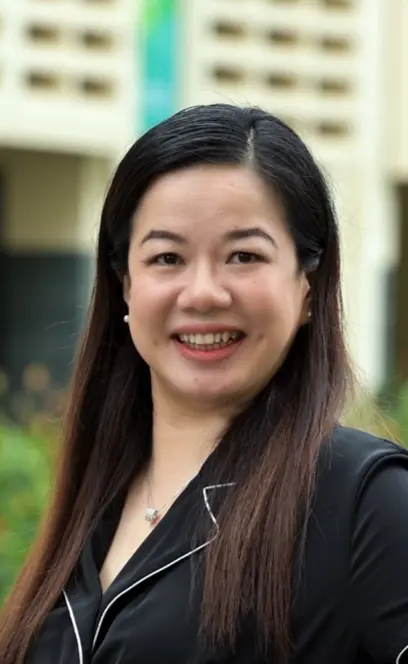Ching Sing Chai
Chinese University of Hong Kong
C7: Sub-Conference on Practice‐driven Research, Teacher Professional Development and Policy of ICT in Education (PTP)
In search of Intelligent Pedagogical Content Knowledge (IPACK)
The advancements of artificial intelligence (AI) have made it necessary for teachers to consider how they could integrate AI into teaching and learning. While research in this area is still in its early stage, it seems clear that the technological pedagogical content knowledge needs to be reframed as intelligent pedagogical content knowledge (IPACK), especially for the use of AI in Education (AIED). This study attempts to provide a pilot review on existing studies and propose an initial framework to facilitate teacher’s design of IPACK. Associated case studies from various subjects will also be shared.

Ching Sing Chai is a professor at the Chinese University of Hong Kong. He is currently the Associate Dean of Higher Education. His research interests are in the areas of Technological Pedagogical Content Knowledge (TPACK), Artificial Intelligence in education, teachers’ beliefs, design thinking and students’ learning with ICT. He has published more than 150 journal articles in reputable journals listed in the Web of Science. He has also co-authored several monographs including “Design Thinking for Education: Conceptions and Applications in Teaching and Learning”, a Springer-published book.
Wenli Chen
Nanyang Technological University (NTU) Singapore
C4: Sub-Conference on Technology Enhanced Learning for Mobility of Learners and Learning Experiences (TEML)
Multi-Modal Learning Analytics for Learning Design
The Multi-Modal Learning Analytics (MMLA) aims comprehensively understand and optimise learning and the environments in which learning by measuring, collecting, analysing and reporting of various modalities of data about learners and their contexts. Drawing on the learning sciences and cognitive neuroscience theories and methods, Dr Chen Wenli’s research team has conducted studies that involve collecting and analysing diverse modalities of data in collaborative learning contexts with the aim to understand and optimize the learning design. The multi-modal data include cognitive (brain activity captured by fNIRS), visual attention (eye movement tracked by eye tracker), and behavioural (verbal, textual, gesture etc) data when learners are engaged in learning activities. Both inter-brain synchrony and joint attention are examined to inform the level of synergy among the learners in collaborative learning. Analysing multi-modal data in temporal manner can provide insights in both learning outcome and process. This fine-grained analysis offers valuable information on the learning trajectory of learners. The MMLA and temporal analysis approaches provide promising results in advancing our understanding and support of learning design. In addition, the methodological, practical, and ethical challenges associated with MMLA are discussed.

Dr. Wenli Chen is an Associate Professor and Head of the Learning Sciences and Assessment Academic Group at the National Institute of Education, Nanyang Technological University (NTU) Singapore. She is a specialized in Computer-Supported Collaborative Learning (CSCL) and learning analytics. Dr Chen has been invited to deliver keynote speeches at numerous international conferences and has received several Best Paper Awards. She was honoured with the “Distinguished Researcher Award” by the Asia-Pacific Society for Computers in Education and the "Nanyang Education Award" from NTU.
Currently, Dr Chen serves as the Editor-in-Chief for the Journal of Computers in Education, and Learning: Research and Practice, and as the Associate Editor for Instructional Science, Asia Pacific Journal of Education, and Research and Practice in Technology Enhanced Learning.
Dr. Chen is currently the executive committee member for the Asia Pacific Society of Computers in Education and the Global Chinese Society of Computers in Education. She was the co-chair of the CSCL community committee of the International Society of the Learning Sciences (ISLS) (2016-2021). She was the Program Committee Chair or Co-chair for the International Conference of CSCL in 2022, International Conference on Computers in Education 2017, Global Chinese Conference on Computers in Education 2014, and the Organizing Committee Chair for International Conference of the Learning Sciences 2016, and International Conference on Computers in Education 2012.
Johanna Pöysä-Tarhonen
University of Jyväskylä
C2: Sub-Conference on Computer-Supported Collaborative Learning (CSCL) and Learning Sciences
How to Better Understand the Collaborative Component in Computer-Supported Collaborative Learning (CSCL): Current Landscape, Challenges and Future Prospects
Given the ubiquity of collaboration in everyday learning environments, collaboration is still frequently presumed to manifest spontaneously, without requiring additional support. In the realm of Computer-Supported Collaborative Learning (CSCL), despite a substantial body of research in this field, what underlies successful collaboration and collaborative learning remains a challenge. Since its inception, research in Computer-Supported Collaborative Learning (CSCL) has drawn from a rich mixture of diverse theoretical and methodological underpinnings, merging three interrelated components: collaboration within various social learning formations, centred around a shared task, enabled by technologies. My talk explores the collaborative component within CSCL, with collaboration itself as the object of study. I contend that to focus on collaboration is important as the process of nurturing collaborative practices is likened to foster the development of additional capabilities supporting us to learn. By focusing on the recent CSCL research, including examples of my own work, I will discuss aspects related to the ‘anatomy’ of (un)successful collaboration. I will explore how we may unveil the complex interacting elements and dynamics of collaboration in CSCL environments through studying the very foundational basis of social interaction by leveraging the theories of joint attention and joint action as well as employing advanced empirical methods such as eye-tracking. I will also address the challenges posed by the increasing complexity of these types of data, particularly in terms of integrating theories and empirical evidence in this regard. I will conclude by focusing on the emerging opportunities and challenges of collaboration by the integration of AI in CSCL environments, while also raising the question of what collaboration entails within this context.

Dr. Johanna Pöysä-Tarhonen is a senior researcher at the Finnish Institute for Educational Research (FIER), University of Jyväskylä, Finland, and a Docent at the Philosophical Faculty, University of Eastern Finland. She holds a PhD in Instructional Technology from KU Leuven, Belgium. Much of her work has focused on collaborative learning practices in varied technology-rich educational settings, most recently on remote collaborative problem solving. Additionally, she maintains a keen interest in learning environments research, with her current focus on hybrid collaborative learning spaces as well as their scalability across different levels of education. She has led research projects and research bids as well as secured funding for studies in learning environments research and Computer-Supported Collaborative Learning (CSCL), funded by the Research Council of Finland (formerly the Academy of Finland) and the Ministry of Education and Culture, Finland. She has published several research papers in esteemed international journals, field-defining books, and conference proceedings.
